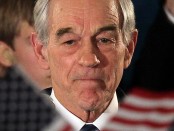Neocons Take Aim at Ron Paul
January 5, 2012

For most horserace reporters, the big story of the 2012 GOP presidential caucuses in Iowa was the virtual tie of Rick Santorum, long viewed as a fringe candidate, with Mitt Romney, the race’s closest thing to a consistent frontrunner.
But only three points behind—in a solid third-place showing—was Rep. Ron Paul (R-TX), the eccentric, antiwar libertarian whose candidacy has variously sparked controversy, confusion, and upheaval across traditional party lines. Remarking on the significance of Paul’s showing, Antiwar.com’s John Glaser wrote, “The only antiwar candidate reaped tens of thousands votes in the first campaign event of the pro-war party.” Glaser suggested that the caucus results were the latest indication that “antiwar sentiment has lost at least some of its pariah-like qualities within the [Republican] party.”
But for many establishment Republicans and neoconservatives, as well as some interventionist-leaning liberals, Paul’s attitude toward foreign policy remains very much “pariah-like,” and his critics have launched a late-hour attempt to demonize Paul’s views or play down his showing in Iowa.
For example, although Romney, Santorum, and Paul represent three distinct strains within the GOP, Foreign Policy’s Peter Feaver—a Bush-era National Security Council staffer—has attempted to argue that “the big intra-party fight over foreign policy is over, if it ever really began.” Reasoning that the caucuses “are likely to be the high-water mark” for Paul, Feaver seemed to conclude that Paul’s views on the wars were unlikely to further influence the GOP primary.
Commentators with a more ideologically hawkish bent have been more pointed in their arguments. “There is a special irony that the man who put Ron Paul in his place and thereby did his party a great service is none other than Rick Santorum, who is the Republican most despised by the left,” wrote Jennifer Rubin. Affecting relief at Paul’s third-place finish behind the more hawkish Santorum and Romney, Rubin trumpeted, “a pro-freedom, hawkish national security outlook triumphed. It was a central part of Santorum’s message, and it was a view embraced by Mitt Romney as well.”
There is ample indication that Paul’s poll numbers going into Iowa had leading neocons worried. In a column titled “Seriously, Iowa? Ron Paul?”, AEI’s Marc Thiessen launched a full-frontal assault on Paul’s anti-interventionism. “It would bring discredit on the state of Iowa,” he warned, “if Hawkeye Republicans make their choice for president of the United States a man who opposes the killing of bin Laden, blames the United States for 9/11 and says we should not even spy on Iran, much less stop it from getting the bomb.” On the same day, Jonathan Tobin of the neoconservative Commentary speciously wrote that “It has long been apparent that Ron Paul’s isolationist foreign policy has far more to do with the agenda of the anti-American left than anything resembling the ideas conservatives support.”
Yet on the left, Mother Jones’ Kevin Drum—who has at times been overly credulous about wars of choice—blogged that “Politics may make for strange bedfellows, but there are limits. There are some allies that aren't worth having.” Drum called Paul a “destructive, insanely-far-right crank,” and added that “anything [progressives] do to give him a bigger audience is bad for liberalism and bad for the country.”
Paul, whose often racist and xenophobic newsletters from the 1990s have (rightfully) tarnished the candidate’s image, has been described by the neoconservative Jamie Kirchick as “not the plain-speaking antiwar activist his supporters believe they are backing—but rather a member in good standing of some of the oldest and ugliest traditions in American politics.” Glenn Greenwald has retorted, however, that this should not disqualify Paul’s antiwar views from consideration. “The premise here,” he writes, “the game that’s being played, is that if you can identify some heinous views that a certain candidate holds, then it means they are beyond the pale, that no Decent Person should even consider praising any part of their candidacy.”
Iowa may well prove a high-water mark for Paul—and even there he was outpolled by two considerably more militaristic opponents. But the reactions of his more hawkish critics suggest considerable alarm about the potential crumbling of the old “neocon consensus” that one might divine in Paul’s candidacy and his showing in Iowa. Confronted by a field replete with more jingoistic selections, more than a fifth of Iowa caucusers chose the antiwar Paul. Whither the party line?
—Peter Certo
